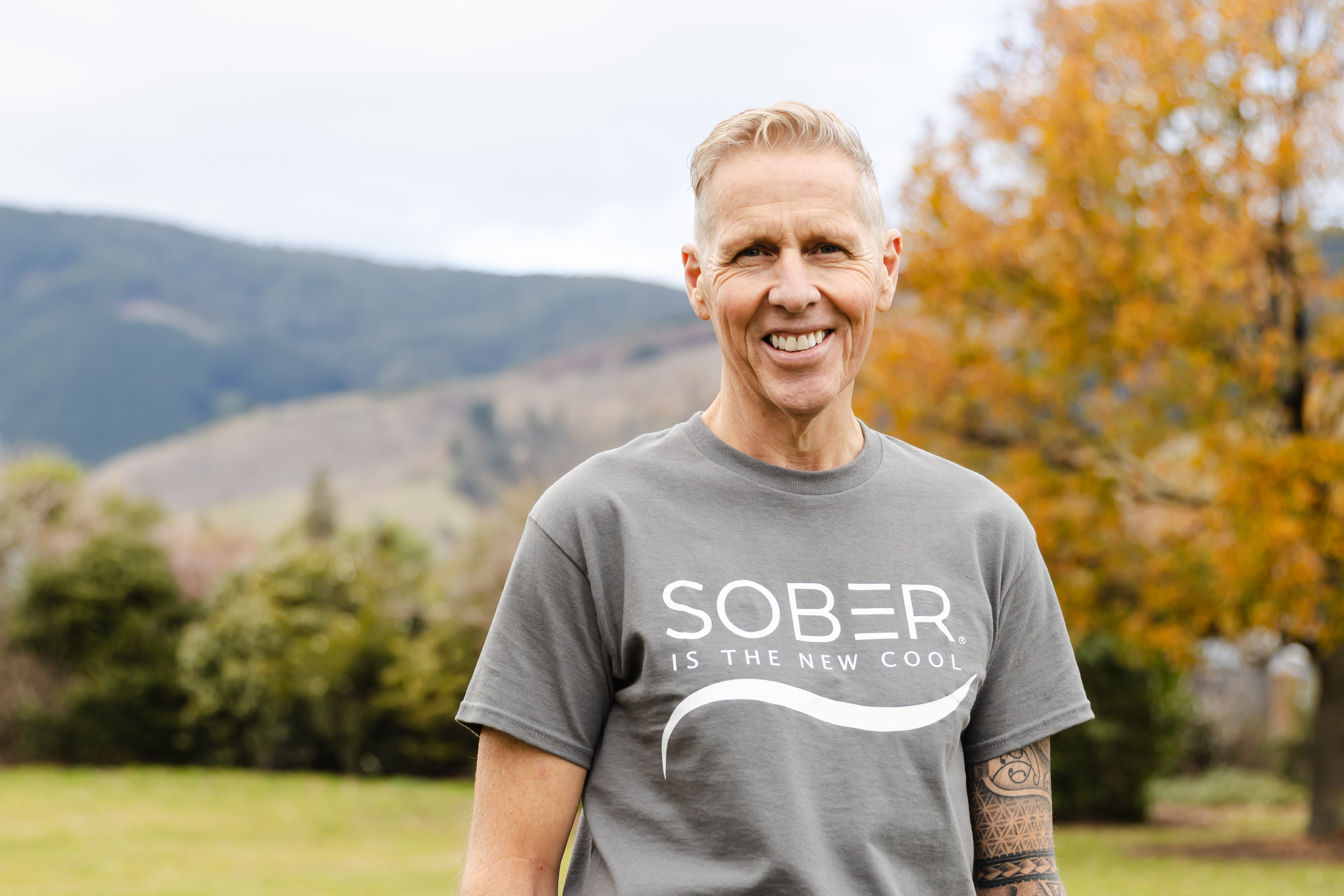Dry ten years


Wayne Askew reflects on his journey from alcoholism to a decade of sobriety. Photo: Tessa Claus
Ahead of Dry July, Charles Anderson spoke to one Nelson man who gave up the grog ten years ago and has never looked back.
Wayne Askew is nervous. He’s put his story into the world many times over. His Instagram following of almost 11,000 has become a community of people seeking solace in his words. But sitting here now he still exudes some of the same characteristics that he says pushed him to use alcohol as a crutch for life. His words sometimes falter. He checks himself. But he knows he is doing the right thing. He wants to share his journey.
“I was just a shy ginger kid,” Wayne says.
From those early days growing up in one of the hardest areas of Napier to now, has been a long path. But it is one decision that he says has transformed his life.
“I was only one bad decision away from finishing things or ending up on the streets,” he says. “There were several times I spent nights in my car.”
Wayne’s journey from the depths of alcoholism to the clarity of a sober life is a powerful testament to resilience, self-discovery, and redemption.
The turning point came after a particularly tumultuous period marked by drinking binges and reckless behavior. His relationships were fraying, and his sense of self worth was at an all-time low.
“I had hit rock bottom. I was embarrassed by my actions, constantly filled with regret,” Wayne says. “Every morning, I would wake up and try to remember the stupid things I had done the night before. It was a vicious cycle.”
The decision to give up alcohol was not a sudden epiphany but rather a slow realisation that he needed to change.
“It’s been ten years, but I’m still learning,” he admits.
His father’s death last year provided a profound moment of reflection.
“I got to see him before he died and understood a bit more about his past. There were so many similarities between us.”
His father had lost his own dad at a young age in a tragic accident on the family farm.
“Dad never spoke of his own father, who was electrocuted in the shearing shed. That loss, and being sent off to boarding school, marked him deeply.”
These unspoken traumas had shaped his father’s inability to express emotions, a trait that had been passed down to him.
“He never told me he loved me.”
That was normal. Whenever there was conflict in the house Wayne recalls his father shrinking and disappearing into the garage for a drink. There he would get some courage, come back and an argument would escalate. It was also that same garage where Wayne had his first drink, with his dad.
Even when they said their final goodbye at the airport, the last time they saw each other, his father couldn’t quite hug him. Before he died, Wayne’s father broke down and cried. Wayne didn’t see it but was told by his dad’s partner later.
“I really do feel happy for him that he was able to reach that point, of showing some emotion.”
Reflecting on his own life, Wayne recalls his childhood as a shy, ginger-haired boy with little confidence.
Back in those days you could walk into an alcohol shop in your school uniform and walk away with beers, he says.
“It was different back then. I was that chubby kid with no self-esteem. I remember the first time I drank at a school party—it felt like a liberation. I could talk to girls and do things I would never dream of doing sober.”
But this initial sense of freedom quickly turned into dependency.
“We’d all drink and take turns driving, doing silly stuff. It’s a wonder I’m still here.”
Then they would turn around and do the same thing the following day.
“It was the embarrassment, you know. You do stupid things. You go out and you’re drunk and say stupid things or you’re embarrassed yourself. And you wake up in the morning and it’s the regret. And then it stopped for a few days and it’s not so bad, time passes and you do it again... If you go all week without a drink and you think you’re doing well so reward yourself with a few extra. There was no moderation.”
Drinking became something Wayne relied on to face social situations and life’s challenges. As he entered adulthood, alcohol remained a constant companion.
“I worked two jobs, and in the evenings, I’d drink while working in my garage on my joinery business. I’d do that for hours. Sport was another outlet, but even that was saturated with alcohol.”
The downward spiral continued until a night of heavy drinking led to him being a victim of a violent altercation, ironically, landing him in Nelson jail.
“We had a massive fight. Alcohol was involved, and things got out of control. That night, I ended up in jail. It was a wake-up call. It was not a nice place to be.”
This incident, among many others, forced Wayne to confront the reality of his alcohol use.
“I knew I had to change. I was destroying my life and the lives of those around me.”
Deciding to quit alcohol wasn’t easy.
“I had to do it for myself, not for anyone else. Not for my kids, not for my wife. It had to be for me.”
The first days and weeks of sobriety were tough. Wayne had to break long ingrained habits and face life without alcohol to rely on.
“I remember thinking that I could never enjoy life without a drink. But I was stubborn enough to stick with it once I made the decision.”
Support from friends and family was crucial.
“My mates never gave me a hard time, they were really respectful and understood. It was a new challenge, but I found strength in their support.”
Over the years, Wayne rebuilt his life, one sober day at a time. He took pride in the milestones he achieved without alcohol, from getting married to being present at the birth of his child 6 years ago.
“Facing major life events sober felt like a triumph. I realized I didn’t need alcohol to celebrate or cope with life.”
His newfound confidence and self-awareness were transformative.
“I started doing things sober that I only ever did drunk before. It was empowering. I found that I could enjoy social events, sports, and other activities without needing a drink.”
Five years into his sobriety, he decided to share his journey on Instagram.
“I didn’t even know what Instagram was. I went to a networking meeting for work, and someone suggested it. Now, people from all over the world reach out to me. It’s incredible.”
Through social media, he found a supportive community and a platform to help others.
“I get private messages and comments from people saying they’re inspired by my story. It’s pretty cool. I never thought I could be an inspiration to anyone.”
To commemorate his journey, he got tattoos that symbolises his transformation.
“The flower of life, then reversed, along with Ta Moko representing my journey from darkness to light. It’s a reminder of where I was and where I am now.”
The tattoo includes his sober date, May the 4th, 2014. “It’s a date I can never forget, and it keeps me accountable.”
When 10 years sober came Wayne felt the weight of that moment.
“I felt proud. And I’d achieved something. Right from the start. And then it was, you know, doing something different. And then I’m stubborn enough to keep with it. And I’m happy to be different.”
Today, his life is a testament to the power of change and resilience. He emphasises the importance of being the best version of oneself for one’s family and community.
“If my story can help someone else, then it’s all worth it.”
His life now is vastly different from his days of heavy drinking.
“I have a close-knit family. My wife comes from a very open and communicative family, something I never had. We talk about everything, and it’s what we’re teaching our son, Charlie. He knows he can talk to us about anything, and I make sure to tell him I love him every day.”

Now in the month of Dry July, his message is clear: “Breaking the habit isn’t easy, but it’s the best decision you can make. You don’t need alcohol to live a fulfilling life.”
“It’s not a bad decision. You’re not giving up life. You’d be amazed how good you feel. Just how well you sleep. You become brighter when you’re not having that anxiety about getting to four o’clock in the afternoon so you can have a drink.”
Reflecting on his decade-long journey, he acknowledges that the road to sobriety is fraught with challenges.
“There were never times when I was tempted to drink again. Social gatherings, holidays, and stressful moments tested my resolve. But I reminded myself why I chose sobriety in the first place.”
He found solace in new routines and healthier habits. Support systems played a crucial role in his journey. Wayne’s friends and family were incredibly supportive. They respected my decision and helped me stay accountable. He also attended the Nelson Alcoholics Anonymous as a way to find community.
Wayne emphasises the importance of seeking help and building a network of support.
“You don’t have to do it alone. There are people out there who understand what you’re going through and can offer guidance and encouragement.”
Mindfulness and self-awareness became key components of his sobriety.
“Three years ago, I started focusing on a word each year that represented what I wanted to work on. Gratitude, understanding, one year, it was ‘awareness.’ I became more aware of my surroundings, how I interacted with people, and how I handled situations.”
This practice helped Wayne stay grounded and present. It allowed Wayne to appreciate the small joys in life and stay focussed. It also helped him recognise triggers and manage them effectively.
“I gotta be the best that I can. I want to be the best that I can for my family and my life. And my group of people.”
Sharing his story on Instagram was a way to give back and support others.
“I get inspired by others and their stories and people that are just starting out and I read what they’re saying.”
Wayne believes that helping others has been instrumental in his own recovery.
For those struggling with alcohol, he offers words of encouragement and practical advice. “Take it one day at a time. Don’t be too hard on yourself if you slip up. What matters is getting back on track.”
He also stresses the importance of finding healthy outlets for stress and emotions.
“Exercise, hobbies, and spending time with loved ones can all help. Find what works for you and stick with it.”
As Wayne looks to the future, he is less nervous. He has a solid job working as a kitchen designer and remains optimistic and focused on maintaining his sobriety.
“I’ve come a long way, but the journey isn’t over. I continue to learn and grow every day.”
This article was published in Nelson Magazine. To read the full edition, click here.
